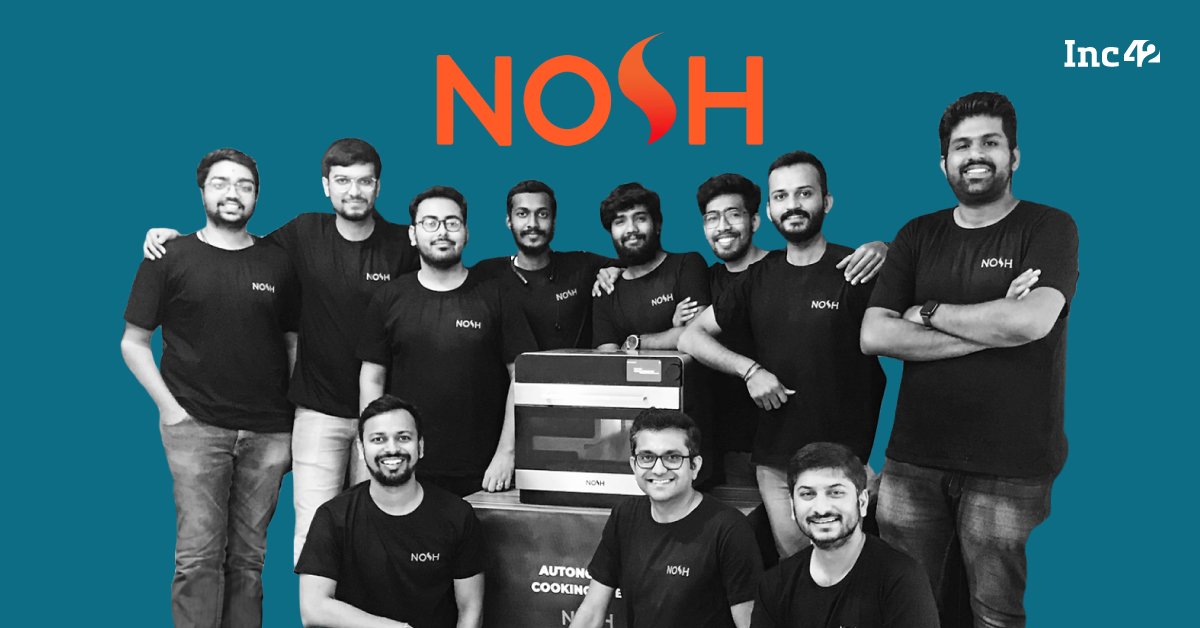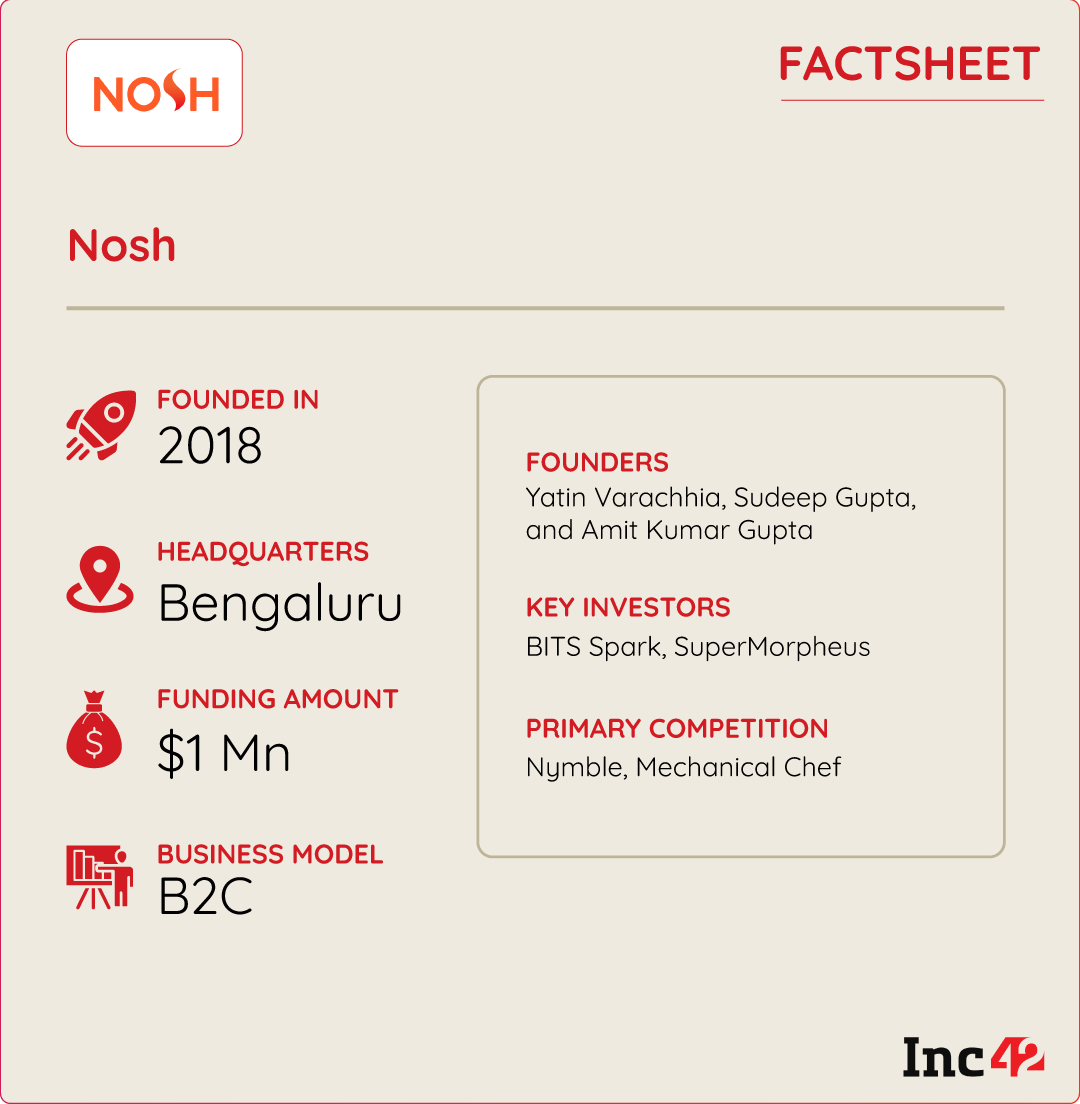Startup Stories
How Nosh’s AI-Powered Robot Chefs Are All Set To Transform Indian Kitchens

Founded in March 2018 by Yatin Varachhia, Sudeep Gupta, and Amit Kumar Gupta, Nosh plans to serve the economically well-to-do migrant population of metropolitan cities to sell its cooking robots to make their life easier, bestowing them with the joy of home-cooked meals
Nosh offers an AI-enabled robot that can follow commands and prepare food automatically. The device comes with over 100 pre-loaded recipes in cuisines including Italian and Indian
Nosh could emerge as one of the pioneering players in the highly lucrative robot kitchen market, which is expected to reach $4.4 Bn in size by 2028
It may sound strange but in the ever-growing world of technology, robots have evolved to keep us well fed. With such technological advancements, it is possible to imagine being able to sit back and relax after a hectic day at work while a robot chef prepares your favourite meal as nutritious and tasty as home-cooked food.
Bengaluru-based startup Euphotic Labs, aka Nosh, is developing AI-enabled robots that can follow commands, cooking instructions, and prepare food, giving you a much-needed respite from your daily hustles.
Founded in March 2018 by Yatin Varachhia, Sudeep Gupta, and Amit Kumar Gupta, Nosh is looking at serving the economically well-to-do migrant population of metropolitan cities to sell its cooking robots to make their life easier, bestowing them with the joy of home-cooked meals.
At a time when robots, equipped with different capabilities, are increasingly gaining popularity among restaurants, food chains, cloud kitchens, and homes, Nosh could emerge as one of the pioneering players in the highly lucrative robot kitchen market, which, as per a report, is expected to reach $4.4 Bn in size by 2028, growing at a CAGR of 12.6% between 2021 and 2028.
The Craving That Gave Birth To Nosh
The idea to build a machine that can cook food at home took shape a few years ago when both Varachhia and his wife were struggling to find time to cook at home due to their hectic work schedule and had no option but to hire help to prepare meals for them.
The couple was surprised to find that several other families, too, were sailing on the same ship and struggling to find time to enjoy cooking and savour the true flavours of food cooked with love and care.
Despite employing the help to cook meals for them, the only thing that was missing was the flavours to satiate their taste buds. This was another pressing issue as the Gujarati couple would often crave authentic Gujarati cuisine, but the flavours largely remained missing from their lives in Bengaluru.
Unable to find a straight solution to satisfy their desire for authentic Gujarati cuisine, Yatin started building Nosh, a machine that can truly automate the entire cooking process, paving the way for Euphotic Labs.
Nosh allows users to load ingredients (veggies, oil, water, etc.) in the machine as per the requirement of a recipe. Once users command it to cook, the device starts cooking as per an individual’s taste and requirement.
It comes with a mobile app through which users can command Nosh’s cooking robot to customise any dish. The device comes with pre-loaded recipes and cooks over 100 of them in cuisines including Italian and Indian.
The device comes with a camera, which helps the AI-powered machine cook perfect meals and healthy treats. The Nosh machines are powered by the startup’s in-house AI and can cook anything that requires a pan or a pot.
Nosh’s Journey To Finding Product-Market Fit
In 2018, Nosh did its first proof of concept but there was a lot of scope for further improvements. Since then, the machine has undergone several tweaks and user trials — both in terms of hardware and AI. Currently, the startup is working on its seventh prototype.
Initially, Nosh built its product for the broader consumer market. However, in 2019, the startup joined hands with cloud kitchens listed on Swiggy and EatFit to automate their operations.
Varachhia explained that with profitability becoming the major focus for these cloud kitchen startups, they adopted the cold chain method rather than cooking fresh food, which ended the use case for Nosh in the cloud kitchen space.
In mid-2020, Nosh reverted to building for the consumer market. “We have received a good response from the consumer market and have been able to pre-book 1,000 orders from across India while there are more than 4,500 people on the waiting list. We have been able to secure these orders with zilch marketing spends,” Varachhia said.

Nosh has charged INR 40,000 per customer for its pre-orders, however, the machines (the cooking robot) are expected to cost INR 50,000 apiece once they are floated in the market. The startup is planning to first start with the delivery of its pre-orders from October this year.
While Nosh has taken the onus on itself to deliver the first lot of pre-orders to its customers, it eventually has plans to sell its cooking robots via various ecommerce platforms like Flipkart and Amazon.
With just $1 Mn in seed funding raised so far, the founders claim to have kept their R&D costs low. Nosh’s cap table includes names like BITS Spark, SuperMorpheus, and a few other angel investors.
Besides, the startup’s working capital is largely driven by pre-orders. Further, the startup’s machines are made at different contract manufacturing facilities.
What’s Next?
In 2024, Nosh aims to make and deploy 5,000 cooking robots but the projections are heavily dependent on the supply chain. The startup is not looking to raise any funding this year due to weak market sentiments.
Meanwhile, Nosh is working on training its AI robots in more Indian recipes and adding a multi-cuisine menu to the already-impressive list of food items that it can make.
In the kitchen robotics market, Nosh competes with Bengaluru-based Nymble and its cooking robot Julia, and another startup Mechanical Chef.
Besides, in the US and European markets, several players, including Samsung, HeroX, NVIDIA, Sony, Miso Robotics, and Moley have launched kitchen robots.
As per a report, North America and Canada are leading the markets for AI-powered kitchens and robotic chefs. Among South Asian countries, India, China, Japan, Malaysia and Singapore are leading the demand for automated chefs and cooking robots.
While there is a huge scope in the global market, it will be interesting to see if Nosh can play its cards right and capture a juicy chunk of this lucrative sector in the years to come.
Startup Stories
Byju’s partially pays March salaries, pending February payouts.

Byju’s, a prominent player in the edtech industry, has encountered financial challenges resulting in delayed salary payments for its employees. As of April 20, the company has only disbursed a portion of March salaries, attributing the delay to a severe cash crunch. Despite earlier assurances from the company’s management that salaries for March would be paid by April 18, many mid-senior employees have reported receiving only 50% of their March salaries. Additionally, February salaries remain unpaid for a significant number of employees, further exacerbating the situation.
Founder and CEO, Byju Raveendran, has resorted to raising personal debt against his stakes in the company to facilitate salary payments. This underscores the severity of the financial challenges facing Byju’s and highlights the lengths to which Raveendran is willing to go to address the issue.
Employee testimonies reveal the extent of the salary delays, with one employee stating that they received only 50% of their March salary on April 20, with 80% of their February salary still pending. Another concerning aspect is the reported disparity between junior and senior employees, with junior staff receiving full salary payments while top management has gone without salaries for the past two months.
Byju’s has acknowledged the delay in salary payments but has not provided a detailed explanation for the situation. A company spokesperson declined to comment on queries from ET regarding the matter. In an email sent to employees on April 8, the management team expressed regret over the delay and attributed it to the inability to secure approval to access funds from a rights issue. The delay has been further compounded by actions from foreign investors, hindering the company’s access to necessary funds.
This revelation follows a previous report by ET on April 1, which highlighted Byju’s decision to delay salary payments due to constraints imposed by warring investors, limiting the company’s access to funds through a rights issue. The ongoing dispute with investors, including Dutch investor Prosus, has added to Byju’s financial woes and has led to further delays in resolving the issue.
In a separate development, Byju’s India chief executive, Arjun Mohan, announced his departure from the company in mid-April, just six months after assuming the role. This unexpected move prompted founder Byju Raveendran to take on the responsibility of overseeing day-to-day operations of the company’s India business, housed under Think & Learn, marking a significant shift in leadership.
Amidst these challenges, Byju’s is embroiled in a legal battle with a group of investors led by Prosus, who are seeking to block a rights issue and the removal of Byju Raveendran as CEO. The company has also initiated arbitration proceedings to address the dispute and find a resolution.
The rights issue undertaken by Byju’s is significant, as it is being offered at a staggering 99% discount to the company’s peak valuation of $22 billion. This steep discount has implications for investors who choose not to participate in the funding, potentially resulting in a significant dilution of their shareholding post-completion of the rights issue.
The unfolding events at Byju’s underscore the challenges facing the edtech giant as it navigates financial constraints, leadership transitions, and legal disputes. The company’s ability to address these issues effectively will determine its future trajectory and its ability to maintain its position in the competitive edtech landscape.
Startup Stories
Revolut India receives provisional approval for PPI license from RBI

Revolut India, a neobank backed by Tiger Global and Softbank, has secured an in-principle approval from the Reserve Bank of India (RBI) for issuing Prepaid Payment Instruments (PPI), encompassing prepaid cards and wallets. CEO Paroma Chatterjee shared this development in a LinkedIn post on Friday. This approval complements Revolut India’s existing licenses from the RBI, which allow it to function as a Category-II Authorised Money Exchange Dealer (AD II), enabling the issuance of multi-currency forex cards and cross-border remittance services.
Chatterjee emphasized the significance of this milestone, highlighting the opportunity it presents to provide Indian consumers with both international and domestic payment solutions on a unified platform. Revolut, Europe’s largest neobank, entered the Indian market in 2021 with aspirations to disrupt the domestic payments sector. The RBI’s approval is expected to bolster Revolut’s position as a key player in this domain.
Prepaid Payment Instruments (PPIs) are payment tools that utilize stored monetary value, including digital wallets, smart cards, or vouchers, for transactions. RBI Governor Shaktikanta Das proposed on April 5, 2024, to allow PPIs to be linked through third-party UPI applications, enabling PPI holders to conduct UPI payments akin to bank account holders.
Chatterjee underscored Revolut’s commitment to full compliance with regulatory requirements, particularly in India, where the neobank has undertaken significant efforts to localize its global tech-stack to adhere to local regulations.
In an interview with ET BFSI, Chatterjee disclosed Revolut’s plans to introduce a comprehensive suite of digital-first money management services for all Indian customers. These services will enable users to manage their finances, including payments and remittances, both domestically and internationally.
The app, currently in use by employees, will be officially launched once the internal testing phase is completed, according to Chatterjee. She also revealed that there are over 175,000 prospective customers on Revolut India’s waitlist, indicating strong interest in the product.
Startup Stories
Postman buys Orbit to extend developer community reach.

Postman, renowned as an API management platform tailored for enterprises, has recently made headlines with its acquisition of Orbit, a pivotal tool in the arsenal of developer companies for nurturing communities across a spectrum of platforms, including Discord, Slack, and GitHub. Although the specifics of the financial transaction remain undisclosed, Postman took to its blog to underline Orbit’s indispensable role in supporting major developer companies in fostering community management and fostering growth over the course of the past four years.
Within the ecosystem of Postman, the integration of Orbit is poised to be transformative, with the Orbit team set to assume a pivotal role in seamlessly embedding community-centric features into the fabric of the Postman Public API Network. This strategic move is aimed at catalyzing dynamic collaboration between content creators and end-users within the network. Postman, boasting a staggering valuation of $5.6 billion, stands as a stalwart in the realm of API collaboration platforms, serving a user base exceeding 30 million developers and 500,000 organizations.
Under the stewardship of Noah Schwartz, a recent addition to the Postman team hailing from Amazon Web Services, the Orbit team is primed to spearhead initiatives aimed at empowering API distributors to broaden the horizons of their communities, optimize API utilization, and solicit direct feedback from users entrenched within the network.
This integration is anticipated to embolden developers to unearth APIs tailored to their unique requirements and foster meaningful engagements with peers to extract maximum value from each API. However, as part of the transitionary phase, Orbit has outlined plans to gradually phase out its existing product and platform over the span of the next 90 days. Commencing July 11, all functionalities will be deactivated, with no provision for the creation of new users or workspaces.
Postman’s strategic maneuver comes on the heels of its triumphant fundraising endeavor in 2021, securing a whopping $225 million in funding. The fundraising round, spearheaded by Insight Partners, witnessed active participation from prominent entities such as Coatue, Bond Capital (helmed by Mary Meeker), and Battery Ventures.
-

 Startup Stories1 year ago
Startup Stories1 year agoWhy Millennials, GenZs Are Riding The Investment Tech Wave In India
-

 Startup Stories1 year ago
Startup Stories1 year agoStartups That Caught Our Eyes In September 2023
-

 Startup Stories1 year ago
Startup Stories1 year agoHow Raaho Is Using Tech To Transform India’s Fragmented Commercial Trucking
-

 Startup Stories1 year ago
Startup Stories1 year agoMeet The 10 Indian Startup Gems In The Indian Jewellery Industry’s Crown
-

 Crptocurrency10 months ago
Crptocurrency10 months agoLither is Making Crypto Safe, Fun, and Profitable for Everyone!
-

 Startup Stories1 year ago
Startup Stories1 year agoWOW Skin Science’s Blueprint For Breaking Through In The $783 Bn BPC Segment
-

 Startup Stories1 year ago
Startup Stories1 year agoHow Volt Money Is Unlocking The Value Of Mutual Funds With Secured Lending
-

 E-commerce1 year ago
E-commerce1 year agoTop Online Couponing Trends To Watch Out For In 2016




